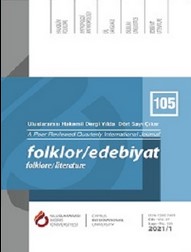Alevi İnancında Can, Ruh Kavramı ve Nefsin Eğitimi
Education of the Nafs in the Context of Sprit and Soul in Alawi Faith
Author(s): İbrahim GülSubject(s): Education, Studies of Literature, Islam studies, Turkish Literature
Published by: Uluslararası Kıbrıs Üniversitesi
Keywords: the Alevi faith; spirit; soul; nafs; training of the nafs;
Summary/Abstract: The concepts spirit, soul and nafs have occupied the human mind for very many centuries. Despite the extensive literature devoted to them, the essence of these concepts has yet to be fully and thoroughly comprehended. The purpose of this study is to explore the concepts spirit, soul and nafs within the context of Islamic-Alevi faith and sources. To this end, a number of Alevi classics have been studied. In this respect, this article is based on literature review. It can be inferred from the findings of this study that spirit and soul are rather complex concepts, and that far too little information has been given to human beings in religious sources as to the essence and nature of these concepts. The words spirit and soul are often used interchangeably, and nafs refers to the unfavorable feelings human beings have that prompt them to commit errors, sins, and crimes. They can, however, resist the urges of the nafs by virtue of their reason and will. In other words, each and every person is capable of training his/her nafs, as taught thoroughly by Islamic mysticism. In the Alevi belief system, as in Islamic mysticism, a person who has completed all the stages of this training is said to have become the perfect human being (insan-ı kamil). Such a person’s soul never dies, even though his/her body may cease to exist. While exploring the concepts of spirit, soul, and nafs in Alevi classics, this study also draws a comparison between the way these concepts are perceived by the Alevis and those adhering to the Islamic-Sunni sects.
Journal: Folklor/Edebiyat
- Issue Year: 27/2021
- Issue No: 105
- Page Range: 211-228
- Page Count: 18
- Language: Turkish

